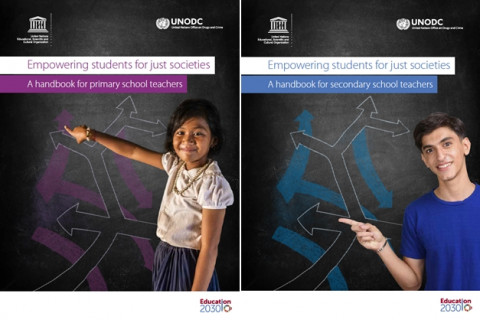
GCED Basic Search Form
Quick Search
You are here
News

- In early 2019, teacher manuals were piloted in schools in 10 countries.
People all over the world are losing trust in leaders and in public institutions. According to the Edelman Trust Barometer, only one in five people feel that ‘the system’ is working for them [1], while polls by Transparency International [2] show that across Latin America, 85 per cent of people think Government corruption is a big problem, with only 21 per cent expressing trust and confidence in leadership. In a 2016 global study [3], in the five Latin American countries sampled, 69 per cent of 13-14 year olds approved of dictatorial governments if they bring order and stability, and 53 per cent supported nepotistic practices such as public servants awarding jobs to their friends.
UNESCO and UNODC are partnering on the project ‘Global Citizenship Education for the rule of law’, aimed at promoting democratic values and the principles of justice in schools. The project engages policy-makers and teacher educators, and links efforts towards Sustainable Development Goals 4 (in particular 4.7 [4] on quality, inclusive and equitable education and 16, calling for the building of peace, justice and strong institutions.
Today sees the launch of two new teachers’ handbooks in Latin America and the Caribbean. (Empowering students for just societies: a handbook for primary school teachers and Empowering students for just societies: a handbook for secondary school teachers), designed to anchor values of fairness and integrity in students. Activities make use of role-play and storytelling to build empathy and understanding of how societies learn to live together. Cecilia Barbieri, Head of UNESCO’s Global Citizenship Education Section said: ‘Schools must be at the heart of educating for democratic values, fundamental rights and the rule of law. Global Citizenship Education gives students the confidence to navigate our institutions and hold leaders to account.’
Many school curricula do not explore the process by which laws evolve, nor how the rule of law protects people from authoritarian regimes. The teacher handbooks were piloted in schools in 10 countries earlier this year. A secondary-school pupil from Nigeria drew this lesson: ‘I thought that anyone in the leadership could just make a law and force others to obey. I didn’t know that rules have process’.
UNESCO and UNODC’s Global Programme for the Implementation of the Doha Declaration recently held a capacity-building workshop in Mexico attended by representatives from education ministries as well as representatives from teacher training institutes from the region. Participants discussed the role that the education sector can play a role in promoting fairer societies and developed regional and national action plans to initiate the change.
Download
*****
[1] Edelman Trust Barometer 2019
[2] Transparency International Global Corruption Barometer Latin America and the Caribbean, 2019
[3] International Civic and Citizenship Education Study (ICCS), 2016. The study was conducted in 30 countries including Chile, Colombia, the Dominican Republic, Mexico and Peru.
[4] SDG 4, target 7 ‘By 2030 ensure all learners acquire knowledge and skills needed to promote sustainable development, including among others through education for sustainable development and sustainable lifestyles, human rights, gender equality, promotion of a culture of peace and non-violence, global citizenship, and appreciation of cultural diversity and of culture’s contribution to sustainable development’. https://www.un.org/sustainabledevelopment/es/education/
